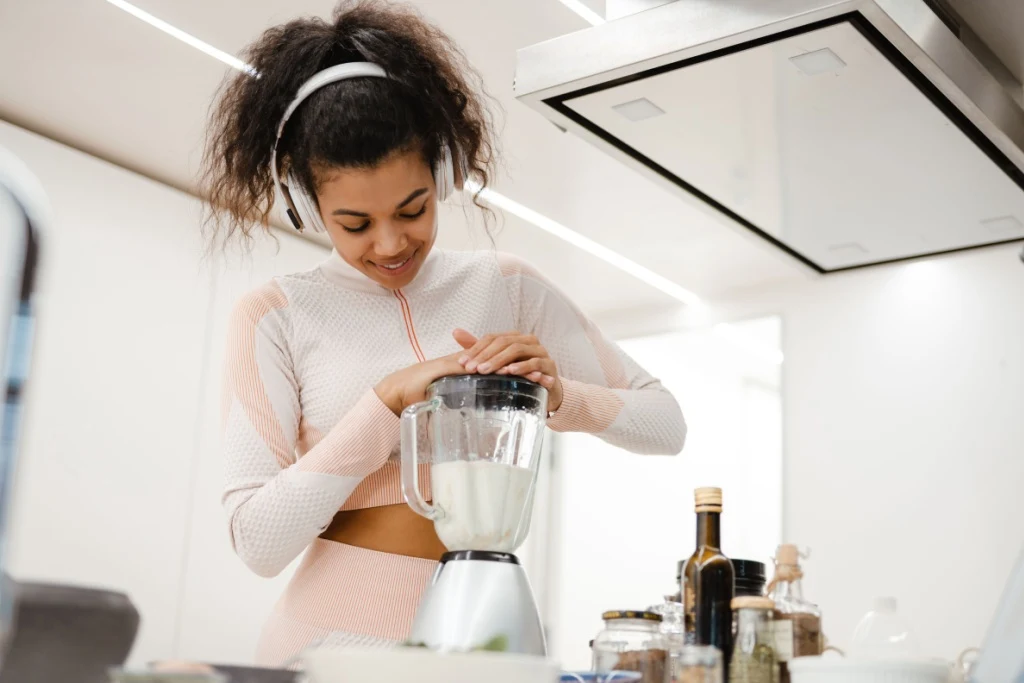Why Protein Powder Timing Isn't A Big Deal
If you’re making protein powder part of your routine, don’t stress about having it immediately after your workout if that doesn't work for you. What’s more important is your overall daily intake.

September 6, 2024 - Updated September 6, 2024

With protein powder being one of the most common supplements, it’s common to wonder when the best time to take it is. Before or after a workout? At the start of the day, as a snack between meals, or right before bed?
If you’re trying to build or maintain muscle or even simply promote faster workout recovery, we get it - you want to make sure you’re doing whatever you can to feel your best and achieve your goals faster, and nutrient timing can seem like a key part of that equation. But, what if we told you that you actually don’t need to stress too much about when you take protein powder? Hear us out for a second.
Why take protein powder in the first place?
Regardless of your goals or dietary preferences, the whole point of protein powder is a no-brainer - to increase your protein intake. But the benefits of increasing your protein intake? Depending on your unique body, lifestyle, diet and goals, your ultimate aim could be to:
Hit a daily protein target, especially if you’re following a plant-based diet
Feel more satisfied after eating
Maintain or build muscle mass
Prioritise your health in general, as protein helps with other vital processes such as cell repair, hormone production, bone health and immune function.
No matter what you're trying to achieve, the exact time of day when you have protein powder isn’t going to dramatically shift the dial on your results. What’s more important is making sure you’re hitting your overall daily intake with a range of protein-rich foods spread across your meals. Cramming it all into one sitting isn’t a clever tactic as your body can only absorb so much at a time.

What about the post-workout protein hype?
Previously, there was a belief that your ideal window for protein consumption was within 30 minutes of your workout ending, but research has shown that this window is in fact much larger, and isn’t something to stress about if you’re not hungry or don’t have a chance to eat straight after exercising.
Although post-workout can be a great time to have a protein-rich snack or meal and increase your daily intake, it’s not the be all and end all, with studies showing that your total protein intake is the strongest predictor of changes in strength and muscle size. Your body continues to repair, rebuild and absorb protein throughout the day, and as we mentioned - you can only consume so much protein in one sitting anyway.
Post-workout still remains one of the most popular times to take protein powder, as according to the Cleveland Clinic, your body is primed to use any protein you consume and it can help you to recover and refuel, but the National Academy of Sports Medicine highlights that there are no universally perfect sports nutrition rules for everyone. It’s important to listen to your body to create habits that work for you.
If you’re consistently eating enough protein each day and following a structured training program, the results will happen. If you’re consistently consuming protein powder straight after your workouts but are never hitting your daily protein target, it’s not some magical solution - you’re always going to fall short.

Different ways to consume protein powder
Whether you prefer whey protein or a plant-based variety, many people have protein powder in its most simplest form - a shake with water or your choice of milk - but you can also throw some in a smoothie (there are heaps of smoothie recipes in the Sweat app), mix it into oats or yoghurt, or bake it into snack bars, bliss balls or pancakes. Remember, you should always treat protein powder as a supplement on top of a nourishing and balanced diet, not a meal replacement.
A protein shake or smoothie can be a quick, satiating option to start your day if you’re not much of a breakfast person or are trying to switch to a high-protein option, or even a snack between meals. Still peckish after dinner or haven’t eaten enough protein for the day? Protein yoghurt (we love it with a sprinkle of berries!) makes for a delicious dessert option.
The only other thing worth noting around protein powder and meal-timing is that it’s not always the best pre-workout snack option as protein takes longer to digest than carbohydrates and can leave your tummy feeling off during your Sweat session. If you need some extra energy, focus on easy to digest carbs such as a banana, muesli bar, or toast with jam or honey.
While we will always encourage you to get your protein from wholefood sources first, protein powder can be an incredibly convenient tool to support your health and fitness goals. If you feel good and it’s easy for you to consume it straight after a workout - great - otherwise, don’t sweat it. Find a way of preparing it that you like and a time that works for you. Focusing on eating different sources of protein throughout the day and consistently getting your overall intake will set you up for success more than worrying about exact nutrient timing.

Erin is a writer and editor at Sweat with years of experience in women's publishing, media and tech. She's passionate about the power of movement, and you can often find her on a yoga mat, a hike, a dance floor, in the ocean or the gym.
* Disclaimer: This blog post is not intended to replace the advice of a medical professional. The above information should not be used to diagnose, treat, or prevent any disease or medical condition. Please consult your doctor before making any changes to your diet, sleep methods, daily activity, or fitness routine. Sweat assumes no responsibility for any personal injury or damage sustained by any recommendations, opinions, or advice given in this article.
Fitness